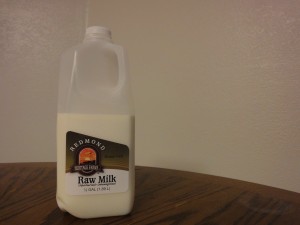Milk does the body good, but there are some in Utah who say some milk can have the opposite effect.
A bill signed by Gov. Gary Herbert this month will modify provisions relating to the sale and testing of raw milk in Utah.

The bill, SB244 Substitute Utah Department of Agriculture and Food Amendments, sponsored by Sen. David Hinkins, R-Orangeville, will allow the continued sale of raw milk, which the CDC recently reported caused the majority of dairy-related disease outbreaks during an eight-year study.
The bill’s passage highlights the stark differences of opinion on the benefits of raw milk.
Brandon Foote, developer of Redmond Heritage Farms, said raw milk is just as safe as pasteurized milk and better for you if it’s produced in an exceptionally clean manner.
Redmond Heritage Farms sells its raw milk at Real Foods Market in Orem, one of the few stores in Utah County that sells raw milk.
He said the raw milk they produce is not pasteurized; it is not homogenized and comes from pasture-fed cows.
“It’s made the way nature intended it to be,” Foote said. “Pasteurization destroys enzymes and good antibodies that our body needs to help the digestive system and to help strengthen immunity.”
Foote said there is no difference between pasteurized milk and raw milk in terms of cleanliness and the number of bacteria allowed.
“Pasteurized milk, after it’s been cooked, can have 20,000 colony-forming units of bacteria per milliliter of milk and 10 coliform per milliliter,” Foote said. “In order for raw milk to be sold legally, it has to meet those same requirements.”
Foote said thorough testing is done to make sure it’s safe.
“Some people say raw milk isn’t clean,” Foote said. “Well that’s simply not true if it’s certified raw milk and it’s licensed and inspected by the state.”
He said there are two ways to get clean milk.
“You can produce it and then cook most of the bacteria out using pasteurization,” Foote said. “Or the other alternative is to produce milk that is clean to begin with so the bacteria counts are so low you don’t need to cook it.”
Foote said they keep the milk clean by keeping the cows and barn clean and then doing testing.
“The milk is flash cooled to inhibit bacteria growth,” Foote said. “Every batch we ship is tested to make sure it meets the standards and then every store sends a sample to a certified milk lab to make sure the milk is meeting the requirements before it’s sold.”
Foote said his family has seen health benefits since they started drinking raw milk.
“We have noticed less ear infections and quicker recovery when it comes to colds,” he said. “The number of cavities has dropped by 90 percent, and the need to go to the doctor for an antibiotic is significantly less.”
However, Lynn Ogden, professor of food science for 29 years, said raw milk is not any more nutritious than pasteurized milk.
“There is nothing about the pasteurization process that makes it less nutritious,” Ogden said.
Ogden said if raw milk is properly sold it should be safe, but it’s a lot easier to ensure safety with pasteurized milk.
“Pasteurized milk has been treated with just enough heat to kill pathogens if they (are) present,” Ogden said.
Ogden, who grew up drinking raw milk on a dairy farm in Richfield, said today’s milk is a lot cleaner because of pasteurization.
“It doesn’t see the light of day until you pour it in your glass. It’s very well protected,” Ogden said. He then noted, “I’m a firm believer in pasteurized milk for the safety of the public.”
Christine Sellers, a senior studying psychology, said she switched from pasteurized milk to raw milk six months ago after her sister recommended it to her.
“I didn’t do a ton of research on it at first; I just wanted to see if I felt better, and I did,” Sellers said. “It was the first time I didn’t feel sick after drinking milk.”
Sellers said when she was drinking pasteurized milk, her stomach would often feel upset, but that has not happened with raw milk.
“A lot of people think they are allergic to dairy or their body can’t digest it,” Sellers said, “but dairy might not be the problem; it could just be the type of milk they’re drinking.”
Sellers said she drinks a lot less milk than she used to.
“Pasteurization destroys a lot of the vitamins and minerals in the milk,” Sellers said. “So I would never feel satisfied because my body wasn’t really getting the nutrients it needed. If the food we’re eating isn’t nutritious, then we will keep eating because our body isn’t actually nourished.”
It is not only the nutrition, but the flavor of raw milk, that has made Sellers a believer.
“Besides the health aspect, raw milk tastes better, too!” Sellers said.




